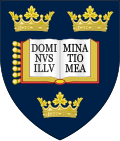References
- 1 2 "Coxed, John(1730–1822)". The Clergy of the Church of England Database 1540–1835 . CCEd Person ID 92647. Retrieved 29 May 2021.
- 1 2 Foster, Joseph (1888–1891). . Alumni Oxonienses: the Members of the University of Oxford, 1715–1886 . Oxford: James Parker – via Wikisource.
- ↑ The Political State of Great Britain. J. Baker and T. Warner. 1739. p. 282.
- ↑ Milner, John (1838). The History and Survey of the Antiquities of Winchester: With Supplementary Notes. James Robbins. p. 167.
- ↑ The History and Antiquities of Winchester: Setting Forth Its Original Constitution, Government, Manufactories, Trade, Commerce and Navigation, Its Several Wards, Parishes, Precincts, Districts, Churches, Religious and Charitable Foundations, and Other Public Edifices: Together with the Charters, Laws, Customs, Rights, Liberties, and Privileges of that Ancient City. J. Wilkes. 1773. p. 127.
- ↑ Lewis, Harold (1876). The Church Rambler: A Series of Articles on the Churches in the Neighborhood of Bath. Hamilton, Adams. p. 416.
- ↑ "Methuen, Paul (1723-95), of Corsham and Bradford-on-Avon, Wilts., History of Parliament Online". www.historyofparliamentonline.org.
